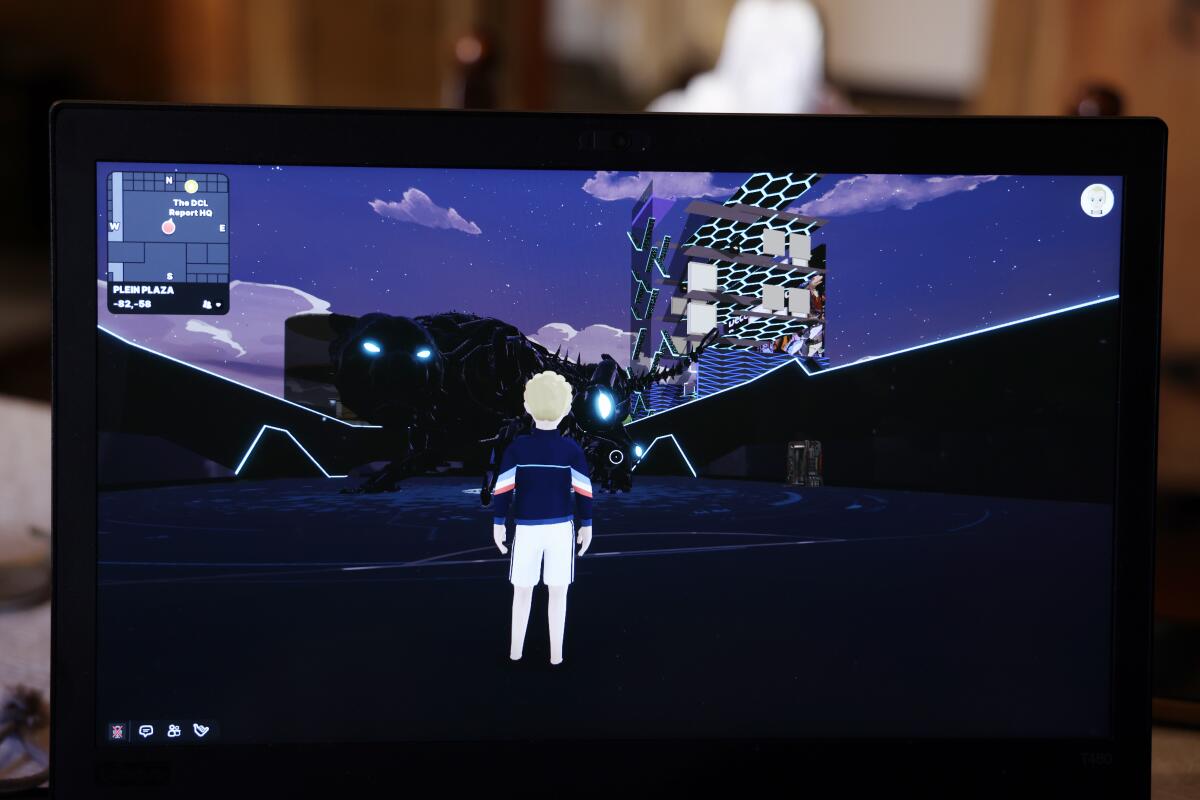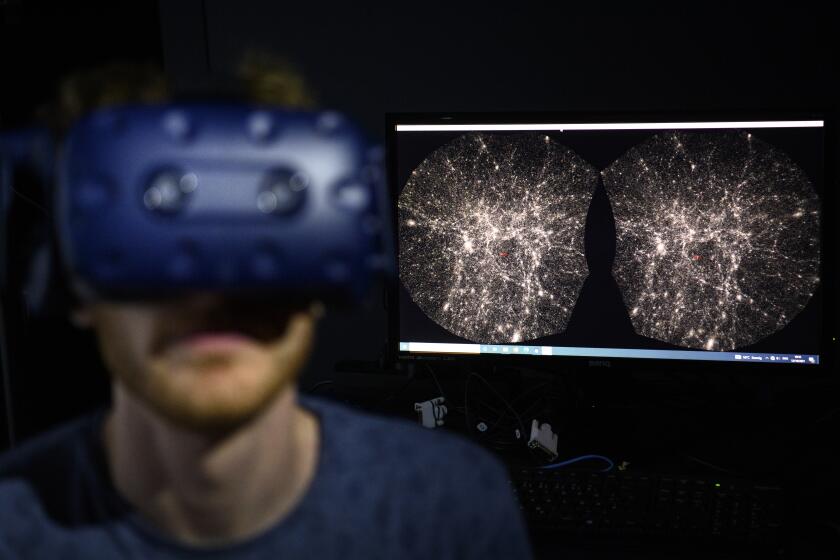Op-Ed: Is life a simulation? If so, be very afraid

- Share via
There’s a new creation story going around. In the beginning, someone booted up a computer. Everything we see around us reflects states of that computer. We are artificial intelligences living in an artificial reality — a “simulation.”
It’s a fun idea, and one worth taking seriously, as people increasingly do. But we should very much hope that we’re not living in a simulation.
Although the standard argument for the simulation hypothesis traces back to a 2003 article from Oxford philosopher Nick Bostrom, 2022 is shaping up to be the year of the sim. In January, David Chalmers, one of the world’s most famous philosophers, published a defense of the simulation hypothesis in his widely discussed new book, “Reality+.” Essays in mainstream publications have declared that we could be living in virtual reality, and that tech efforts like Facebook’s quest to build out the metaverse will help prove that immersive simulated life is not just possible but likely — maybe even desirable.
Are we living in a simulation? Filmmaker Rodney Ascher probes the age-old conundrum in his new documentary, ‘A Glitch in the Matrix.’
Scientists and philosophers have long argued that consciousness should eventually be possible in computer systems. With the right programming, computers could be functionally capable of independent thought and experience. They just have to process enough information in the right way, or have the right kind of self-representational systems that make them experience the world as something happening to them as individuals.
In that case, the argument goes, advanced engineers should someday be able to create artificially intelligent, conscious entities: “sims” living entirely in simulated environments. These engineers might create vastly many sims, for entertainment or science. And the universe might have far more of these sims than it does biologically embodied, or “real,” people. If so, then we ourselves might well be among the sims.
The argument requires some caveats. It’s possible that no technological society ever can produce sims. Even if sims are manufactured, they may be rare — too expensive for mass manufacture, or forbidden by their makers’ law.
Still, the reasoning goes, the simulation hypothesis might be true. It’s possible enough that we have to take it seriously. Bostrom estimates a 1-in-3 chance that we are sims. Chalmers estimates about 25%. Even if you’re more doubtful than that, can you rule it out entirely? Any putative evidence that we aren’t in a sim — such as cosmic background radiation “proving” that the universe originated in a Big Bang — could, presumably, be simulated.
Suppose we accept this. How should we react?
Chalmers seems unconcerned: “Being in an artificial universe seems no worse than being in a universe created by a god.” He compares the value of life in a simulation to the value of life on a planet newly made inhabitable. Bostrom acknowledges that humanity faces an “existential risk” that the simulation will shut down — but that risk, he thinks, is much lower than the risk of extinction by a more ordinary disaster. We might even relish the thought that the cosmos hosts societies advanced enough to create sims like us.
In simulated reality, we’d still have real conversations, real achievements, real suffering. We’d still fall in and out of love, hear beautiful music, climb majestic “mountains” and solve the daily Wordle. Indeed, even if definitive evidence proved that we are sims, what — if anything — would we do differently?
The term “metaverse” is the latest buzzword to capture the tech industry’s imagination -- so much so that one of the best-known internet platforms is rebranding to embrace the futuristic idea.
But before we adopt too relaxed an attitude, consider who has the God-like power to create and destroy worlds in a simulated universe. Not a benevolent deity. Not timeless, stable laws of physics. Instead, basically gamers.
Most of the simulations we run on our computers are games or scientific studies. They run only briefly before being shut down. Our low-tech sims live partial lives in tiny worlds, with no real history or future. The cities of “Sim City” are not embedded in fully detailed continents. The simulated soldiers dying in war games fight for causes that don’t exist. They are mere entertainments to be observed, played with, shot at, surprised with disasters. Delete the file, uninstall the program, or recycle your computer and you erase their reality.
But I’m different, you say: I remember history and have friends who have been to Australia. Of course, it seems that way. The ordinary citizens of Sim City, if they were somehow made conscious, would probably be just as smug. Simulated people could be programmed to think they live on a huge planet with a rich past, remembering childhood travels to faraway places. Their having these beliefs in fact makes for a richer simulation.
If the simulations humans are familiar with reveal the typical fate of simulated beings, long-term sims are rare. Alternatively, if we can’t rely on the current limited range of simulations as a guide, our ignorance about simulated life runs even deeper.
Taking the simulation hypothesis seriously means accepting that the creator might be a sadistic adolescent gamer about to unleash Godzilla. It means taking seriously the possibility that you are alone in your room with no world beyond reading a fake Los Angeles Times, existing only as a short-lived subject or experiment. You might know almost nothing about reality beyond and beneath the simulation. The cosmos might be radically different from anything you could imagine.
The simulation hypothesis is wild and wonderful to contemplate. It’s also radically skeptical. If we take it seriously, it should undermine our confidence about the past, the future and the existence of Milwaukee. What or whom can we trust? Maybe nothing, maybe no one. We can only hope our simulation god is benevolent enough to permit our lives to continue awhile.
Really, we ought to hope the theory is false. A large, stable planetary rock is a much more secure foundation for reality than bits of a computer program that can be deleted at a whim.
Eric Schwitzgebel is a professor of philosophy at UC Riverside and author of “A Theory of Jerks and Other Philosophical Misadventures.”
More to Read
A cure for the common opinion
Get thought-provoking perspectives with our weekly newsletter.
You may occasionally receive promotional content from the Los Angeles Times.










